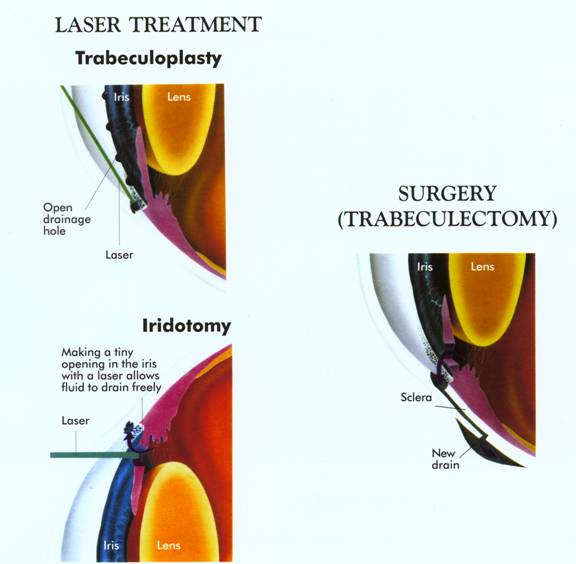GLAUCOMA
 Glaucoma is a major public health problem, causing visual impairment which hampers day to day work. Glaucoma is the largest cause of bilateral blindness, second only to the cataract. In India the incidence of glaucoma is around 3% of the population.
Glaucoma is a major public health problem, causing visual impairment which hampers day to day work. Glaucoma is the largest cause of bilateral blindness, second only to the cataract. In India the incidence of glaucoma is around 3% of the population.
Glaucoma is a serious condition that involves an elevation in pressure inside the eye caused by a build-up of excess fluid. Left untreated, this pressure can impair vision by causing irreversible damage to the optic nerve and, eventually, blindness. Glaucoma results in peripheral vision loss, and is an especially dangerous eye condition because it frequently progresses without obvious symptoms & hence is called the silent killer of sight.
There is no cure for glaucoma, although it can be treated. The damage to the optic nerve from Glaucoma cannot be reversed. However, lowering the pressure in the eye can prevent further damage to the optic nerve and further peripheral vision loss.
Why does the pressure increase?
Our eyeball contains a fluid called Aqueous humor, which nourishes the eye and keeps it healthy. After the fluid circulates, it empties through a drain in the front of your eye (similar to the drainage in your bathroom). In people with glaucoma, the drain in the eye is blocked and the fluid can't run out of the eyeball. Instead, the fluid accumulates inside the eye and causes increased pressure in the eye.
What does the increased pressure do to our eyes?
Increased pressure inside a small chamber will cause bulging of the weakest part. Similarly in our eyes, this will exert pressure on the weakest part that is the optic nerve. Gradual increase in the pressure on the optic nerve will result in gradual loss of peripheral vision & with time leads to blindness. Once damaged optic nerve cannot be revived with any form of treatment.
Are there any risk factors for developing glaucoma?
Any one can develop a glaucoma. However a family history of glaucoma increases the risk by many folds. Also age above 40yrs, presence of Diabetes, Hypertension are other risk factors.
Are there any risk factors for developing Glaucoma?
Anyone can develop a Glaucoma. However a family history of glaucoma increases the risk by many folds. Also age above 40yrs, presence of Diabetes, Hypertension is other risk factors.
What are the symptoms of glaucoma?
Most patients who have Glaucoma don't have any symptoms. We might not realize that we are losing vision until it's too late. Half of all people with loss of vision caused by glaucoma are not aware they have the disease. By the time they notice loss of vision, the eye damage is severe.
Rarely a person with glaucoma may experience headaches or the power of his glasses may change very frequently. In severe cases haloes may be seen around bright lights.
However in a different form called Angle closure glaucoma, the eye becomes red and extremely painful. Nausea, vomiting and blurred vision may also occur.
So how do we know if we have Glaucoma?
We won't know we have Glaucoma until you notice vision loss, which unfortunately is a late sign. Since Glaucoma causes no symptoms other than vision loss, it is important that we have a complete eye exam by an ophthalmologist regularly. An ophthalmologist can measure your eye pressure, examine your optic nerve and evaluate your central and peripheral vision. Early diagnosis and treatment of Glaucoma can prevent damage to the eye's nerve cells and prevent vision loss. Eye examination is not synonymous with checking the power of your eyes (as will be done by technicians at optical shops). It should be done by an ophthalmologist & we should insist on the pressure check every time we visit him.
What tests are done to diagnose Glaucoma?
Many a times Glaucoma can be diagnosed with just a clinical examination. However to know the exact extent of the damage & also to track the progress of the condition we do an automated visual field analysis. This test will show the exact areas of damage & we can track if the treatment has arrested the progress of damage with time. In some doubtful cases sophisticated tests such as optic nerve head analysis are done to confirm the diagnosis.
What is the treatment for glaucoma?

Glaucoma can be treated with eye drops, laser surgery, eye surgery or a combination of methods. The purpose of treatment is to lower the pressure in the eye so that further nerve damage and vision loss are prevented. Treatment once started will be life long & should not be stopped unless advised by the doctor.
How often should I have an eye exam?
It is generally recommended that you have a complete eye exam by age 39. After that, eye exams should be done every yearly. Please remember that eye examination should be done by an ophthalmologist & insist on the eye pressure check on every visit. In conclusion Glaucoma, a silent killer of sight, has no warning symptoms. Only regular eye examination by an ophthalmologist can detect the condition & prevent further damage.

